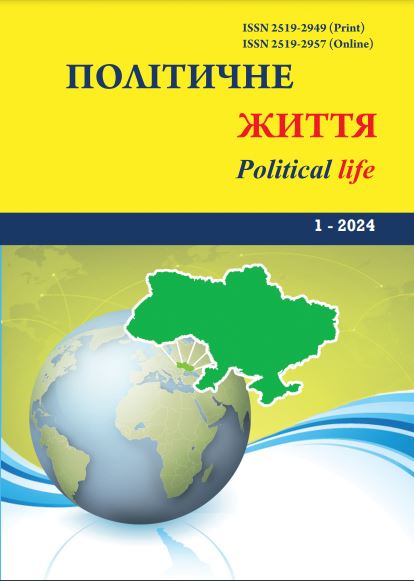Between illiberal democracy and populism: majoritarian authoritarianism in the European political context
DOI:
https://doi.org/10.31558/2519-2949.2024.1.10Keywords:
illiberal democracy; liberal democracy; power; populism; majoritarian authoritarianism; political systems; leadership; personality; power; legitimacy (of power); political regime; democracy; political process; political orderAbstract
The article explores the functioning peculiarities of contemporary European political systems, liberal and illiberal democracies, elucidates the concept of populism, and substantiates the practical interaction of these terms.
The central focus of the article is to challenge the claims of nationalist-populists regarding their exclusive ownership of representing the collective will of the "national people" and their ability to determine the quality of "democracy." To achieve this, the article has the following objectives: to clarify the concepts of democracy, liberalism, and populism to provide a solid theoretical foundation for further discussion; to analyze the intricate and interconnected nature of contemporary democracy and political liberalism, illustrating that these concepts cannot be easily separated; to argue why the use of the term "illiberal democracy" is misleading and dangerous and propose the adoption of the category "majoritarian authoritarianism" for a better understanding and analysis of European populism.
The research employs various methodologies, including the systematic approach, bibliographic research, and theoretical generalization.
In recent years, liberal democracy in Europe has faced significant challenges from nationalist-populist political forces that label themselves as "illiberal democracies," as is currently happening in Hungary under the regime of Viktor Orban. One of the fundamental problems in the current European political landscape is the growth of populism, which is accompanied by the disassociation between two key components of constitutional and liberal democracy that formed the basis of European democracies after the Second World War.
The article examines three main components of contemporary democracy: the sovereignty of the people, representative governance, and political liberalism as a mechanism for limiting political power and ensuring individual rights and freedoms.
Multiple interpretations of liberalism are considered, including one that emphasizes the political analysis of institutional power balance and another grounded in the idea that the "market" is a collection of individual interactions within civil society, aiming to create strong bonds of interdependence among members of the socio-economic sphere.
Special attention is given to the characteristics of populism as a political tool, particularly the contradictions between the principle of popular sovereignty and the liberal principle. These contradictions are vital and inherently unstable aspects of democracy.
The article suggests avoiding the use of the label "illiberal democracy," which is often erroneously applied to describe nationalist-populism, and instead advocates for examining the current political situation in Europe through the lens of "majoritarian authoritarianism." It is determined that this perspective opens up opportunities for scholarly research in the realms of political, social,
or psychological studies.
References
Chopin, T. (2019). « Démocratie illibérale » ou « autoritarisme majoritaire » ? Contribution à l’analyse des populismes en Europe. URL: http://surl.li/kskyc
Monod, J.C. (2018), « Le culte du chef, une résurgence ? », in Badie, B., Vidal, D. (dir.), Le retour des populismes. L’état du monde 2019
Mink, G. (2016). L’Europe centrale à l’épreuve de l’autoritarisme. Politique étrangère, Été(2), 89. https://doi.org/10.3917/pe.162.0089
Voir Mudde, C., Rovira Kaltwasser, C. (2017), Populism: A very short introduction, op. cit., chap. 5.
Застава, І. В. (2019). Теоретичні підходи до визначення індикаторів демократії. Сучасне суспільство: політичні науки, соціологічні науки, культурологічні науки, 84–94. https://doi.org/10.34142/24130060.2019.17.1.08
Романюк О.І. Що таке «дефектні демократії» і якими вони бувають. Вісник Національного університету «Юридична академія України імені Ярослава Мудрого». Серія: Політологія / редкол.: А.П. Гетьман та ін. Харків : Право, 2017. № 2 (33). 396 с. С. 114–123.

